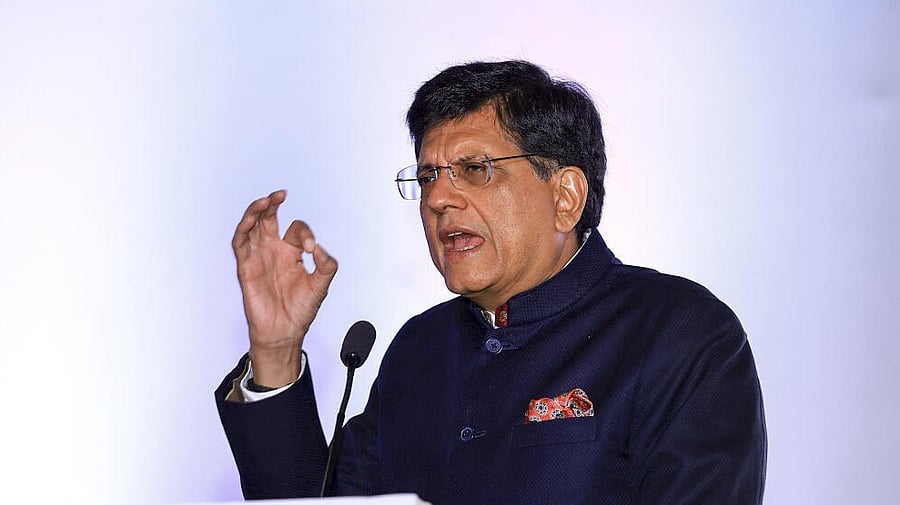
Union Minister for Commerce and Industry Piyush Goyal.
Credit: PTI Photo
New Delhi: The country's organic products' exports have the potential to jump over three-fold to Rs 20,000 crore over the next three years, Commerce and Industry Minister Piyush Goyal said on Thursday.
He said this while releasing the eighth edition of the National Programme for Organic Production (NPOP) with new regulations aimed at enhancing clarity and transparency in organic product standards as well as aligning with global standards.
"Currently, our organic product exports are at Rs 5,000-6,000 crore. In the next three years, we can easily achieve Rs 20,000 crore exports, about 3-3.5 times increase from the current level," Goyal said.
He said the global demand for these products is about Rs 1 lakh crore, which can grow up to Rs 10 lakh crore in the coming years, a unique opportunity India should not miss.
India already has one of the largest numbers of farmers in the world undertaking organic farming.
He also asked startups to come up with solutions that help in the sector's growth.
The minister also launched five portals -- TraceNet 2.0, APEDA, NPOP, Organic Promotion and AgriXchange.
The NPOP has undergone several revisions since its inception in May 2001.
The eighth edition marks a significant update to the regulatory framework governing organic products in India, with the last revision occurring in 2014.
Key features of the eighth edition of NPOP include farmer-friendly regulations, streamlined certification, enhanced transparency and a revamped traceability system.
The latest edition aims to bolster India's organic export sector, with an ambitious target of reaching $2 billion in organic food exports by 2030.
Ministers of State for Cooperation Krishan Pal Gurjar and Murlidhar Mohol, Minister of State for Commerce Jitin Prasada and Cooperation Secretary Ashish Kumar Bhutani were also present at the event.
NPOP plays a crucial role in enhancing the credibility of organic products in both national and international markets. It ensures that agricultural products labelled as "organic" meet stringent standards, thereby protecting consumer interests and promoting sustainable agricultural practices.
It is overseen by the Commerce Ministry, with the Agricultural and Processed Food Products Export Development Authority (APEDA) managing its implementation.
TraceNet 2.0 is an upgraded traceability platform of NPOP for seamless operations and enhanced tools for regulatory oversight.
On the occasion, a dedicated NPOP portal was launched for more visibility and ease of Operations for Organic stakeholders. An upgraded redesigned APEDA portal and agri-exchange portal were also unveiled.
The redesigned APEDA portal was showcased with enhanced user experience and information for the benefit of Agri and Processed food products' stakeholders.
The redesigned AgriXchange platform will enable more user-friendly data analysis and generation of reports and data on agricultural exports, making it accessible to the general public.
The revised NPOP regulations would help India achieve the $2 billion export target for organic food products by 2030.
The NPOP is a key government programme that strengthens India's organic certification system, promoting sustainable farming practices and opening new opportunities for farmers and exporters.
By setting high standards for organic products, NPOP enhances India's competitiveness in the global organic market while helping farmers adopt eco-friendly and economically viable practices.
During April-November this fiscal, these exports rose by about 40 per cent to $456 million. It was $495 million in 2023-24.
The NPOP is the primary organic regulatory standard of the country, it is accepted by the importing countries and has been a key driver for market access of organic products.
The NPOP standards for crop production have been recognised by the European Commission and Switzerland as equivalent to their country's standards and are also accepted by Great Britain.
APEDA has been designated as the secretariat for the implementation of the NPOP and regulatory oversight over the operations of the certification bodies. It was last revised in 2014.
The main export destinations include the US, European Union, Canada, UK, Switzerland, Australia, the Middle East and Asian countries.
The major export items are cereals and millets, processed food, tea, spices, dry fruits, sugar, medicinal plant products, pulses, coffee, oil cake/meal, and oil seeds.
The ministry said that the eighth edition of the NPOP introduces key amendments aimed at promoting ease of operations and enhancing transparency for stakeholders, including farmers.
Certification requirements for organic grower groups have been simplified, and these groups are now granted legal status in place of the Internal Control System (ICS).
The revised derogation provisions allow for a potential reduction of up to three years in the land conversion period to organic, subject to conditions and safeguards.
The ICS of organic grower groups must ensure the procurement of the entire organic produce or establish market linkages to support farmers.